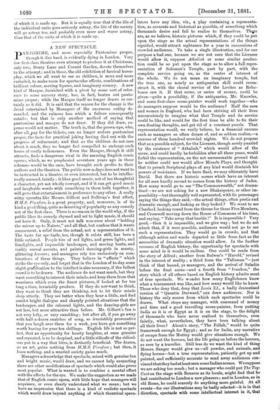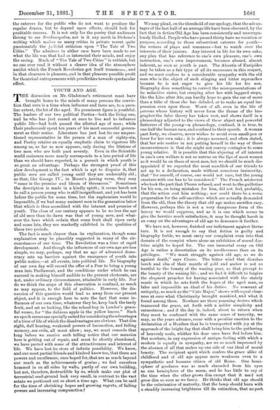A NEW SPECTACLE.
PANTOMIME, and more especially Pantomime proper, though it dies hard, is evidently dying in London. Very few first-class theatres even attempt to produce it at Christmas, only two, Drury Lane and Covent Garden, devote themselves to the attempt; and in those, the old exhibition of farcical horse- play, which we all went to see as children, is more and more curtailed, to make room for spectacular effects, combinations of brilliant colour, moving figures, and imaginary scenery. A new kind of Masque, furnished with a pivot by some sort of refer- ence to some nursery story, has, in fact, beaten out panto- mime proper; while the Masque itself no longer draws so cer- tainly as it did. It is said that the reason for the change is the dread entertained by Managers of the enormous outlay de- manded, and the ruinous loss which a failure consequently entails ; but that is only another method of saying that pantomime and masque do not draw. If they did draw, ex- pense would not matter. The truth is, that the grown-ups, who, after all, pay for the tickets, can no longer endure pantomime proper, the taste for practical joking having died out with the progress of refinement ; and that as the children do not care about it much, they no longer feel compelled to undergo such hours of costly tediousness. Even the Masque, though it still attracts, finds a dangerous rival in the amusing English comic operas, which, as we prophesied seventeen years ago in these columns would be the case, have brought such profits to their authors and the theatres. The public now-a-days does not want to be instructed in a theatre, or even interested, but to be intellec- tually amused, faintly ; it likes good music, not of too thoughtful a character, yet not wholly corrupt, and if it can get good music and laughable words with something in them both together, it will go to that entertainment in preference to any other. A really witty operetta like Messrs. Gilbert and Sullivan's first effort, MKS. Pinafore, is a great property, and, moreover, is of its kind a good thing, quite as deserving of popularity as any comedy not of the first class. There is no reason in the world why, if the public likes its comedy rhymed and set to light music, it should not have it. Only, it must not talk nonsense about "holding the mirror up to Nature," and all that, but confess that it wants amusement, a relief from the actual, not a representation of it. The taste for spectacle, too, though it exists still, has been a little satiated. People tire of red lights, and green lights, and limelights, and impossible landscapes, and moving boats, and visibly unreal ascents, and painted dancing-girls in scanty, glittering dresses ; and managers rely too exclusively on com- binations of these things. They believe in " effects " which strike the eye only, and forget that in the London of to-day some slight gratification to the intellect is also necessary, if the fullest crowd is to be drawn. The audience do not want much, but they want something to interest their minds,and keep them from that weariness which even the finest pictures, if looked at for too long a time, invariably produce. If they do not•want to think, they want to think they are thinking, not to let their minds sleep utterly. They see better when they hear a little, and find amidst bright dialogue and sharply pointed situations that the landscapes, and the coloured lights, and the dancing-girls are not less, but more attractive than before. Mr. Gilbert's fun is not very lofty, or very ennobling ; but after all, if you go away- with half•a-dozen snatches of song, so irresistibly provocative that you laugh over them for a week, you have got something worth having for your ten shillings. English life is not so per- fect, that an opportunity for hearty laughter, at once genuine and repeated, is to be despised, and a little ridicule of the ridicul- ous put in a way that bites, is distinctly beneficial. The drama, as an art, gains nothing from H.M.S. Pinafore ; but then, it loses nothing, and a wearied society gains much.
Managers acknowledge that spectacle, mixed with genuine fun and bright music, would draw, and we cannot help suspecting there are other modifications of spectacle which would also piove most popular. What is wanted is to combine a mental effect with the effects for the eye. We make the suggestion as we made that of English comic opera, with little hope that managers will acquiesce, or even clearly understand what we mean ; but we have an impression that there is a kind of realistic spectacle which would draw beyond anything of which theatrical specu-
lators have any idea, viz., a play containing a representa- tion, as accurate and historical as possible, of something which thousands desire and fail to realise to themselves. Thve are, as we believe, historic pictures which, if they could be put upon the stage as the actual representations of the things signified, would attract sightseers for a year in successions of crowded audiences. To take a single illustration, and for our purpose a bad one, because we are not sure that the Licenser would allow it, suppose Athaliah or some similar produc- tion could be so put upon the stage as to allow a full repre- sentation of Solomon's Temple, part by part, with the complete service going on, as the centre of interest of the whole. We do not mean an imaginary temple, but the true one, as nearly as antiquarian skill could recon- struct it, with the choral service of the Levites as Reho- boam saw it. If that scene, or series of scenes, could be given—quite a possibility, if the antiquaries, Mr. Knowles, and some first-class scene-painter would work together—who do managers suppose would be the audience ? Half the men and women in England, who had been striving all their lives unconsciously to imagine what that Temple and its service could be like, and would for the first time be able to fix their own floating thoughts, and get rid of a constant puzzle. That representation would, we verily believe, be a financial success such as managers so often dream of, and so seldom realise,—a success of three hundred crowded nights. We do not propose that as a possible subject, for the Licenser, though sorely puzzled by the existence of " Athaliah," which would allow of the scene, and could hardly be forbidden after all these years, would forbid the representation, on the not unreasonable ground that he neither could nor would allow Miracle Plays, and thought that to permit Scriptural plays of any kind would diminish his powers of resistance. If we have Saul, we may ultimately have David. But there are historic scenes which have an interest for all men hardly second to scenes from the history of Judea. How many would go to see "The Commonwealth," not drama- tised—we are not asking for a new Shakespeare, or other im- possibility—but thoroughly well represented, with its personages saying the things they said,—the actual things, often poetic and dramatic enough, and looking as they looked ? We want to see Charles I. looking round from the throne for those Five Members, and Cromwell moving down the House of Commons of his time, and saying, " Take away that bauble !" It is impossible ? Very good,—then it is impossible, and we give way ; but we do not admit that, if it were possible, audiences would not go to see such a representation. They would go in crowds, and that although action and words departed as little from fact as the necessities of dramatic situation would allow. In the further recesses of English history, the opportunity for spectacle with some mind in it would be endless. One could be made from the story of Alfred ; another from Bulwer's "Harold," revised in the interest of reality ; a third from the "Talisman "—just think of that hound, ye managers, and the arrival of Saladin before the final scene—and a fourth from " Ivanhoe," the story which of all others based on English history admits most of true spectacle. We wonder how many Englishmen know what a tournament was like, and how many would like to know. Those who deny that, deny that Louis XL, a badly dramatised version of " Quentin Durward," can draw audiences. Nor is history the only source from which such spectacles could be drawn. What stops any manager, with command of money and time and a good travelling scene-painter, from putting India as it is or Egypt as it is on the stage, to the delight of thousands who have never realised to themselves, even faintly, what, nevertheless, they have been talking about all their lives ? Abont's story, " The Fellah," would be quite framework enough for Egypt ; and as for India, any narrative of escape from the Mutiny would give situations enough. We do not want the horrors, but the life going on before the horrors, as seen by a traveller. Still less do we want the kind of thing Messrs. Sanger would give us—all powder, and animals, and flying horses—but a true representation, patiently got up and painted, and sufficiently accurate to send away audiences con- vinced that they had at least seen some Indian scenes. We suppose we are asking too much ; but a manager who could put The Toy- Cart on the stage with Benares as its locale, might find that he had contributed to London a new pleasure ; and in London, as in old Rome, he could scarcely do anything more gainful. At all events—for our illustrations may be badly selected—it is in that direction, spectacle with some intellectual interest in it, that the caterers for the public who do not want to produce the regular drama, but to depend upon effects, should look for profitable success. It is not only for the poetry that audiences throng to see Sardanapalus, nor is it any merit in Dickens's writing which makes so many critics in private resent quite passionately the judicial criticism upon " The Tale of Two Cities." The admirers in either case have been made to see what the life was that had so interested their minds, and enjoy the seeing. Much of "The Tale of Two Cities" is rubbish, but no one ever read it without a clearer idea of the atmosphere amidst which the French Revolution got itself transamea , and in that clearness is pleasure, and in that pleasure possible profit for theatrical entrepreneurs with proclivities towards spectacular effect.







































 Previous page
Previous page